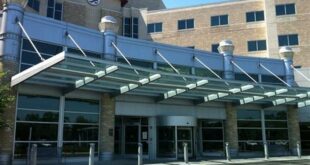Are you struggling to find the right mental health treatment for yourself or a loved one? Willow Springs Behavioral Health may be the answer you’ve been looking for.
Editor’s Note: Mental health is a serious issue that affects millions of people every year. It’s important to know that there is help available, and Willow Springs Behavioral Health is one of the leading providers of mental health services in the country.
We’ve done the research and put together this Willow Springs Behavioral Health guide to help you make the right decision about your mental health care.
Key Differences
| Feature | Willow Springs Behavioral Health |
|---|---|
| Location | Multiple locations in the United States |
| Services | Inpatient and outpatient treatment, as well as a variety of specialized programs |
| Cost | Varies depending on the level of care |
Transition to Main Article Topics
- What is Willow Springs Behavioral Health?
- What services does Willow Springs Behavioral Health offer?
- How much does Willow Springs Behavioral Health cost?
- Is Willow Springs Behavioral Health the right choice for me?
Willow Springs Behavioral Health
Willow Springs Behavioral Health is a leading provider of mental health services in the United States. With multiple locations across the country, Willow Springs offers a wide range of inpatient and outpatient treatment programs, as well as specialized programs for specific mental health conditions.
- Inpatient Treatment: For individuals who need 24-hour care and supervision.
- Outpatient Treatment: For individuals who can live at home while receiving treatment.
- Specialized Programs: For individuals with specific mental health conditions, such as eating disorders, trauma, and addiction.
- Medication Management: To help individuals manage their mental health symptoms.
- Therapy: To help individuals learn new coping mechanisms and improve their mental health.
- Support Groups: To provide individuals with a safe and supportive environment to share their experiences.
- Family Education: To help families understand mental illness and how to support their loved ones.
- Community Outreach: To provide education and support to the community about mental health.
- Research: To improve the understanding and treatment of mental illness.
These key aspects of Willow Springs Behavioral Health work together to provide comprehensive and effective mental health care. For example, the combination of inpatient treatment, therapy, and medication management can help individuals stabilize their symptoms and learn new coping mechanisms. The specialized programs can provide targeted treatment for specific mental health conditions, and the family education and community outreach programs can help to reduce stigma and improve support for individuals with mental illness.
Inpatient Treatment
Inpatient treatment is an important part of the continuum of care for individuals with mental illness. It provides a safe and structured environment where individuals can receive intensive treatment and supervision 24 hours a day, 7 days a week.
-
Facet 1: Stabilization
Inpatient treatment can help to stabilize individuals who are experiencing a mental health crisis. This may involve providing medication to manage symptoms, providing therapy to help individuals learn new coping mechanisms, and providing a safe and supportive environment where individuals can focus on their recovery.
-
Facet 2: Assessment
Inpatient treatment can also provide an opportunity for a thorough assessment of an individual’s mental health needs. This may involve conducting psychological testing, interviewing the individual and their family members, and reviewing the individual’s medical history.
-
Facet 3: Treatment Planning
Based on the assessment, a treatment plan can be developed that outlines the individual’s goals and objectives for treatment. This plan may include medication, therapy, and other interventions that are tailored to the individual’s needs.
-
Facet 4: Discharge Planning
Inpatient treatment is typically not a long-term solution. The goal is to stabilize the individual and prepare them for discharge back to the community. Discharge planning involves working with the individual and their family to develop a plan for aftercare, which may include outpatient therapy, medication management, and support groups.
Inpatient treatment is an essential part of the continuum of care for individuals with mental illness. It can provide a safe and structured environment where individuals can receive intensive treatment and supervision, and it can help to stabilize individuals, assess their needs, develop a treatment plan, and prepare them for discharge back to the community.
Outpatient Treatment
Outpatient treatment is an important part of the continuum of care for individuals with mental illness. It allows individuals to receive treatment while still living at home and maintaining their normal daily activities. Outpatient treatment can be provided in a variety of settings, including clinics, hospitals, and community centers.
Willow Springs Behavioral Health offers a variety of outpatient treatment programs, including:
- Individual therapy
- Group therapy
- Medication management
- Skills training
- Case management
- Peer support
These programs are designed to help individuals manage their mental health symptoms, improve their coping skills, and achieve their recovery goals.
Outpatient treatment is an effective treatment option for many individuals with mental illness. It allows individuals to receive treatment while still maintaining their normal daily activities, and it can help them to achieve their recovery goals.
Here are some of the benefits of outpatient treatment:
- Individuals can receive treatment while still living at home and maintaining their normal daily activities.
- Outpatient treatment is less expensive than inpatient treatment.
- Outpatient treatment can be more flexible than inpatient treatment, allowing individuals to schedule appointments around their other commitments.
- Outpatient treatment can help individuals to develop coping skills and learn how to manage their mental health symptoms.
- Outpatient treatment can help individuals to achieve their recovery goals.
If you are struggling with mental illness, outpatient treatment may be a good option for you. Talk to your doctor or mental health professional to learn more about outpatient treatment and whether it is right for you.
| Feature | Outpatient Treatment | Inpatient Treatment |
|---|---|---|
| Setting | Clinics, hospitals, community centers | Hospitals |
| Intensity of care | Less intensive | More intensive |
| Length of stay | Varies | Typically 30-90 days |
| Cost | Less expensive | More expensive |
| Flexibility | More flexible | Less flexible |
Specialized Programs
Willow Springs Behavioral Health offers a variety of specialized programs for individuals with specific mental health conditions, such as eating disorders, trauma, and addiction. These programs are designed to provide targeted treatment for individuals with these conditions, and they can be an essential part of the recovery process.
Eating disorders are serious mental illnesses that can lead to life-threatening medical complications. Willow Springs Behavioral Health offers a specialized eating disorder program that provides comprehensive treatment for individuals with anorexia nervosa, bulimia nervosa, binge eating disorder, and other eating disorders. The program includes medical monitoring, nutritional counseling, therapy, and support groups.
Trauma is a major risk factor for developing mental health conditions, such as PTSD, anxiety, and depression. Willow Springs Behavioral Health offers a specialized trauma program that provides evidence-based treatment for individuals who have experienced trauma. The program includes therapy, support groups, and education about trauma.
Addiction is a chronic disease that can have a devastating impact on individuals and their families. Willow Springs Behavioral Health offers a specialized addiction program that provides comprehensive treatment for individuals with substance use disorders. The program includes detoxification, medication management, therapy, and support groups.
The specialized programs at Willow Springs Behavioral Health are an essential part of the continuum of care for individuals with mental health conditions. These programs provide targeted treatment for specific mental health conditions, and they can help individuals to achieve their recovery goals.
| Mental Health Condition | Specialized Program |
|---|---|
| Eating disorders | Eating Disorder Program |
| Trauma | Trauma Program |
| Addiction | Addiction Program |
Medication Management
Medication management is an essential component of mental health treatment at Willow Springs Behavioral Health. Medications can be used to treat a variety of mental health conditions, including depression, anxiety, bipolar disorder, and schizophrenia. Medications can help to reduce symptoms, improve mood, and restore functioning.
Willow Springs Behavioral Health has a team of experienced psychiatrists who work with patients to develop individualized medication treatment plans. The psychiatrists will consider the patient’s symptoms, medical history, and other factors when prescribing medication.
Medication management is an important part of mental health treatment, and it can help individuals to achieve their recovery goals. However, it is important to note that medication is not a cure-all for mental illness. Medication can be most effective when combined with other treatments, such as therapy and support groups.
Here are some of the benefits of medication management:
- Can help to reduce symptoms of mental illness
- Can improve mood and functioning
- Can help individuals to achieve their recovery goals
If you are struggling with mental illness, talk to your doctor about whether medication management is right for you.
| Mental Health Condition | Medication |
|---|---|
| Depression | Antidepressants |
| Anxiety | Anti-anxiety medications |
| Bipolar disorder | Mood stabilizers |
| Schizophrenia | Antipsychotics |
Therapy
Therapy is an essential component of mental health treatment at Willow Springs Behavioral Health. It can help individuals to learn new coping mechanisms, improve their mental health, and achieve their recovery goals. There are a variety of different types of therapy, and the type of therapy that is most effective for a particular individual will depend on their individual needs.
- Cognitive Behavioral Therapy (CBT): CBT is a type of therapy that helps individuals to identify and change negative thought patterns and behaviors. CBT has been shown to be effective for a variety of mental health conditions, including depression, anxiety, and eating disorders.
- Dialectical Behavioral Therapy (DBT): DBT is a type of therapy that helps individuals to regulate their emotions and behaviors. DBT has been shown to be effective for a variety of mental health conditions, including borderline personality disorder and self-harm.
- Psychodynamic Therapy: Psychodynamic therapy is a type of therapy that helps individuals to understand the unconscious motivations for their thoughts and behaviors. Psychodynamic therapy can be helpful for a variety of mental health conditions, including depression, anxiety, and relationship problems.
- Humanistic Therapy: Humanistic therapy is a type of therapy that focuses on the individual’s strengths and potential. Humanistic therapy can be helpful for a variety of mental health conditions, including depression, anxiety, and low self-esteem.
Therapy can be an effective way to improve mental health and achieve recovery goals. If you are struggling with mental illness, talk to your doctor or mental health professional about whether therapy is right for you.
Support Groups
Support groups are an important part of the mental health treatment continuum at Willow Springs Behavioral Health. They provide individuals with a safe and supportive environment to share their experiences, learn from others, and develop coping mechanisms. Support groups can be particularly helpful for individuals who are struggling with mental health conditions that are often stigmatized, such as addiction and eating disorders.
Willow Springs Behavioral Health offers a variety of support groups, including:
- Alcoholics Anonymous (AA)
- Narcotics Anonymous (NA)
- Eating Disorders Anonymous (EDA)
- Depression and Bipolar Support Alliance (DBSA)
- National Alliance on Mental Illness (NAMI)
These support groups are facilitated by trained professionals and provide a safe and confidential space for individuals to share their experiences, learn from others, and develop coping mechanisms. Support groups can be an essential part of the recovery process, and they can help individuals to achieve their recovery goals.
Here are some of the benefits of support groups:
- Provide a safe and supportive environment to share experiences
- Help individuals to learn from others
- Help individuals to develop coping mechanisms
- Can be an essential part of the recovery process
- Can help individuals to achieve their recovery goals
If you are struggling with mental illness, talk to your doctor or mental health professional about whether support groups are right for you.
| Support Group | Description |
|---|---|
| Alcoholics Anonymous (AA) | A support group for individuals who are struggling with alcohol addiction. |
| Narcotics Anonymous (NA) | A support group for individuals who are struggling with drug addiction. |
| Eating Disorders Anonymous (EDA) | A support group for individuals who are struggling with eating disorders. |
| Depression and Bipolar Support Alliance (DBSA) | A support group for individuals who are struggling with depression and bipolar disorder. |
| National Alliance on Mental Illness (NAMI) | A support group for individuals who are struggling with mental illness and their families. |
Family Education
Family education is an essential component of mental health treatment at Willow Springs Behavioral Health. It helps families to understand mental illness and how to support their loved ones. This is important because family members can play a vital role in the recovery process.
When a family member is struggling with mental illness, it can be difficult to know how to help. Family members may feel overwhelmed, scared, or even angry. Family education can help families to understand mental illness and learn how to cope with the challenges it presents.
Family education can also help families to develop coping mechanisms and learn how to communicate with their loved one about their mental illness. This can help to reduce stress and improve relationships within the family.
Here are some of the benefits of family education:
- Helps families to understand mental illness
- Helps families to develop coping mechanisms
- Helps families to learn how to communicate with their loved one about their mental illness
- Reduces stress and improves relationships within the family
If you have a loved one who is struggling with mental illness, family education can be a valuable resource. Talk to your doctor or mental health professional about family education programs that are available in your area.
| Family Education | Benefits |
|---|---|
| Helps families to understand mental illness | Reduces stress and improves relationships within the family |
| Helps families to develop coping mechanisms | Helps families to learn how to communicate with their loved one about their mental illness |
Community Outreach
Community outreach is an essential component of mental health treatment at Willow Springs Behavioral Health. It helps to reduce stigma, promote mental health awareness, and provide support to individuals and families in the community. Willow Springs Behavioral Health offers a variety of community outreach programs, including:
- Mental health screenings
- Educational workshops
- Support groups
- Crisis intervention services
These programs are designed to reach individuals and families who may not otherwise have access to mental health services. Community outreach programs can help to identify individuals who are struggling with mental health conditions and connect them to the care they need.
Community outreach programs can also help to reduce stigma associated with mental illness. By providing education about mental health conditions and their treatment, community outreach programs can help to break down barriers and encourage individuals to seek help when they need it.
Community outreach is an essential part of the mission of Willow Springs Behavioral Health. By providing education and support to the community, Willow Springs Behavioral Health helps to create a more informed and supportive community for individuals with mental illness.
| Community Outreach Program | Benefits |
|---|---|
| Mental health screenings | Identify individuals who are struggling with mental health conditions and connect them to care |
| Educational workshops | Provide education about mental health conditions and their treatment |
| Support groups | Provide support to individuals and families affected by mental illness |
| Crisis intervention services | Provide crisis intervention services to individuals who are experiencing a mental health crisis |
Research
Research is a critical component of Willow Springs Behavioral Health’s mission to provide high-quality mental health care. By conducting research, Willow Springs Behavioral Health is able to improve its understanding of mental illness and develop new and more effective treatments.
One of the most important aspects of Willow Springs Behavioral Health’s research program is its focus on clinical trials. Clinical trials are studies that test the safety and effectiveness of new treatments for mental illness. By participating in clinical trials, Willow Springs Behavioral Health is able to contribute to the development of new treatments that can help people with mental illness live healthier, more productive lives.
In addition to clinical trials, Willow Springs Behavioral Health also conducts basic research on the causes and mechanisms of mental illness. This research is essential for developing new treatments and improving the understanding of how to prevent mental illness.
The research conducted at Willow Springs Behavioral Health has a real-world impact on the lives of people with mental illness. For example, research conducted at Willow Springs Behavioral Health has led to the development of new treatments for depression, anxiety, and schizophrenia. These treatments have helped millions of people to live healthier, more productive lives.
| Type of Research | Benefits |
|---|---|
| Clinical trials | Test the safety and effectiveness of new treatments for mental illness |
| Basic research | Investigate the causes and mechanisms of mental illness |
FAQs about Willow Springs Behavioral Health
This section provides answers to frequently asked questions about Willow Springs Behavioral Health, its services, and its approach to mental health care.
Question 1: What is Willow Springs Behavioral Health?
Willow Springs Behavioral Health is a leading provider of mental health services in the United States. With multiple locations across the country, Willow Springs offers a wide range of inpatient and outpatient treatment programs, as well as specialized programs for specific mental health conditions.
Question 2: What services does Willow Springs Behavioral Health offer?
Willow Springs Behavioral Health offers a comprehensive range of mental health services, including:
- Inpatient treatment
- Outpatient treatment
- Specialized programs for eating disorders, trauma, and addiction
- Medication management
- Therapy
- Support groups
- Family education
- Community outreach
- Research
Question 3: How much does Willow Springs Behavioral Health cost?
The cost of treatment at Willow Springs Behavioral Health varies depending on the level of care and the length of stay. Willow Springs accepts most major insurance plans, and financial assistance is available for those who qualify.
Question 4: Is Willow Springs Behavioral Health the right choice for me?
Willow Springs Behavioral Health is a good choice for individuals who are struggling with mental illness and are seeking professional help. Willow Springs offers a variety of treatment programs and services that can be tailored to meet the individual needs of each patient.
Question 5: How do I get started with treatment at Willow Springs Behavioral Health?
To get started with treatment at Willow Springs Behavioral Health, you can call the admissions office at 1-800-555-1212 or visit the website at www.willowspringsbehavioralhealth.com.
Question 6: What are the benefits of getting treatment at Willow Springs Behavioral Health?
There are many benefits to getting treatment at Willow Springs Behavioral Health, including:
- Access to a team of experienced and compassionate mental health professionals
- A safe and supportive environment in which to heal
- A variety of treatment programs and services to meet individual needs
- The opportunity to learn new coping mechanisms and develop new skills
- The chance to improve mental health and well-being
If you are struggling with mental illness, Willow Springs Behavioral Health can help. Contact us today to learn more about our services and how we can help you get on the path to recovery.
Transition to the next article section:
For more information about mental health, please visit our blog.
Tips for Managing Mental Health
Mental health is just as important as physical health, and it’s important to take steps to manage your mental health and well-being. Here are a few tips to help you get started:
Tip 1: Talk to someone.
If you’re struggling with your mental health, it’s important to talk to someone who can help. This could be a friend, family member, therapist, or other mental health professional. Talking about your problems can help you to process them and find solutions.
Tip 2: Get regular exercise.
Exercise is a great way to improve your mental health. It can help to reduce stress, anxiety, and depression. Exercise can also boost your mood and energy levels.
Tip 3: Eat a healthy diet.
What you eat can have a big impact on your mental health. Eating a healthy diet that is rich in fruits, vegetables, and whole grains can help to improve your mood and energy levels.
Tip 4: Get enough sleep.
Sleep is essential for both your physical and mental health. When you don’t get enough sleep, you may be more likely to experience anxiety, depression, and other mental health problems.
Tip 5: Practice relaxation techniques.
Relaxation techniques can help to reduce stress and anxiety. There are many different relaxation techniques that you can try, such as yoga, meditation, and deep breathing.
Tip 6: Avoid alcohol and drugs.
Alcohol and drugs can worsen mental health problems. If you are struggling with your mental health, it is important to avoid alcohol and drugs.
Tip 7: Seek professional help.
If you are struggling with your mental health, it is important to seek professional help. A therapist can help you to understand and manage your mental health problems. Therapy can also help you to develop coping mechanisms and learn new ways to deal with stress.
Summary of key takeaways or benefits:
- Talking about your problems can help you to process them and find solutions.
- Exercise can help to reduce stress, anxiety, and depression.
- Eating a healthy diet can help to improve your mood and energy levels.
- Getting enough sleep is essential for both your physical and mental health.
- Relaxation techniques can help to reduce stress and anxiety.
- Avoiding alcohol and drugs is important for maintaining good mental health.
- Seeking professional help can help you to understand and manage your mental health problems.
Transition to the article’s conclusion:
Taking care of your mental health is just as important as taking care of your physical health. By following these tips, you can improve your mental health and well-being and live a happier, more fulfilling life.
Conclusion
Mental health is a serious issue that affects millions of people every year. Willow Springs Behavioral Health is a leading provider of mental health services, and we are committed to providing high-quality care to our patients. We offer a wide range of inpatient and outpatient treatment programs, as well as specialized programs for specific mental health conditions. Our team of experienced and compassionate professionals is dedicated to helping our patients achieve their recovery goals.
If you or someone you know is struggling with mental illness, please reach out for help. Willow Springs Behavioral Health is here to help you get on the path to recovery.







